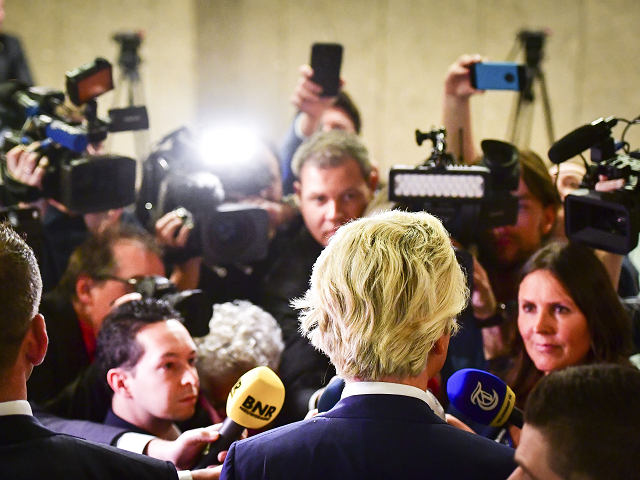Wednesday’s Dutch general election saw a collapse of support for mainstream parties including the conservatives (VVD) and their coalition partners, Labour, but not enough to hand victory to insurgent movements like Geert Wilders’s Party for Freedom (PVV).
After polls closed at 9-pm Dutch time and in the early hours as half the votes had been counted, it was clear that Mr Wilders had not made the breakthrough polls just a fortnight before the vote he would, and that the Dutch incumbent Prime Minister Mark Rutte would likely be staying on.
Yet despite the position of Rutte’s VVD remaining the largest party, the election has seen a dramatic change in fortune for the traditional parties, which beyond a five-point drop for the conservatives saw the vote for the Labour party crash from 26 to 6 points.
The shift means the left-wing party, which has been a key member of the ruling coalition and controlled many government ministries, will likely lose around three-quarters of their members of parliament.
These collapses in the mainstream parties have been a boon to smaller, newer parties which have been boosted in their stead. Mr Wilders’s PVV is projected to pick up at least four more seats, although that is dramatically less than the 15 extras he had hoped for.
Most benefitting are the plethora of leftist parties in the Netherlands, including the surging Green-Left party, who are set to pick up ten extra seats out of the wreckage of the Labour party.
Other notable achievers including the Denk (‘Think’ Party), founded by Turkish-origin former Labour politicians who launched the movement as Europe’s first by-migrants-for-migrants party. They are set to have three members of parliament, a success that may inspire migrants in other European nations.
Despite the setback, Mr Wilders remained upbeat and bullish in a statement given to press early Thursday morning when he insisted that he is more influential than ever in Dutch politics and that his party were “among the winners” of the evening.
Earlier in the evening, the PVV leader took to Twitter to declare that the prime minister hadn’t heard the last of him.
Once the dust has settled from the vote, Dutch MPs will negotiate over potential ruling coalitions, which could take a number of forms. While Mr. Wilders is likely to command either the second or third largest group of MPs in the house, he may be frozen out of negotiations by centrist parties desperate to keep him out of power.
Follow Oliver Lane on Facebook, Twitter: Follow @Oliver_Lane or e-mail: olane[at]breitbart.com

COMMENTS
Please let us know if you're having issues with commenting.